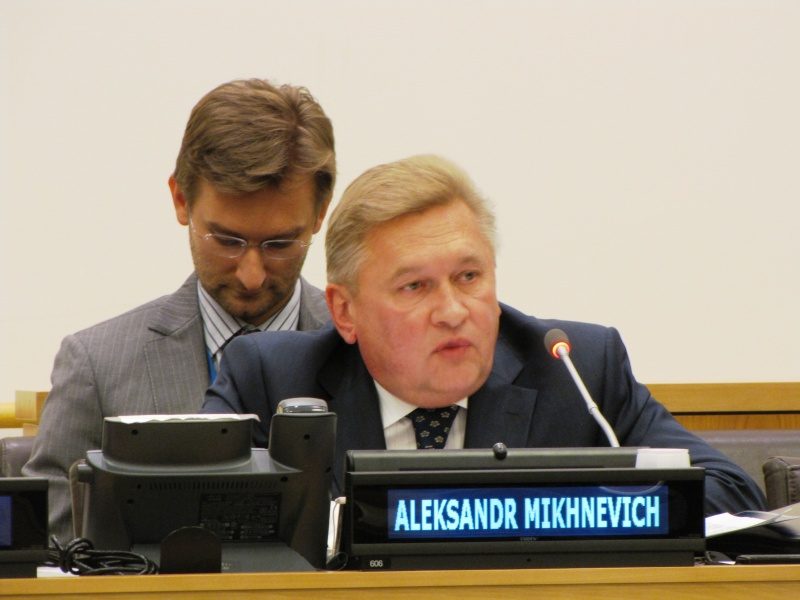First Deputy Foreign Affairs Minister of Belarus Alexander Mikhnevich made an official visit to Vilnius where he stated the necessity to create a united economic space from Lisbon to Vladivostok between the European Union and the Eurasian Union. The Belarussian diplomat was either unaware, or pretended to be unaware, that Lithuania is the last place on the planet where you should voice hopes like these.
“One of the goals on my visit to Lithuania is to figure out what needs to be done in order to go from words to actual integration between the Eurasian Economic Union, which Belarus is part of, and the EU, which Lithuania is part of,” said the Belarussian Deputy MFA in Vilnius, “We need to diversify our trade and economic ties and not just make them in the East or the West, but have a bridge between the East and the West”.
While in Vilnius, Alexander Mikhnevich also lamented the fact that the Lithuania-Belarus goods traffic is still decreasing. He said that the EU sanctions against Russia are to blame – because Belarus, like Lithuania, is on the goods circulation path between these two huge markets. He also mentioned the EU sanctions in place against Belarus.
We would like to reiterate: all of this was said by a representative of official Minsk in Lithuania.
In a country, which fervently demanded more and more sanctions against Russia, and a few years earlier – against Belarus.
At the same time, Belarussian President Alexander Lukashenko received an invitation to the Eastern Partnership Riga Summit. Let us remind you that, two years ago, the weak Lithuanian attempts at getting Belarus to participate in the Vilnius Summit ended in failure. And the reason of that failure is that the Eastern Partnership program in its Lithuanian interpretation was purely ideological and geopolitical, destructive in its agenda, that consisted of destroying old ties and dividing into military and political blocs.
In this iteration, the Eastern Partnership was unacceptable not only to Russia, against whom it was aimed, but also Belarus, whose leaders always note that they were the initiators and supporters of all projects for economic reintegration in the post-Soviet space. Possibly due to this, when discussing the participation of the Belarussian president at the Riga Summit, Lukashenko spoke in favor of changing the Eastern Partnership program format, proposing to move away from political issues in favor of closer economic interaction. This had to be a partnership “not against someone, but in cooperation”.
However, the Latvian interpretation of the Eastern Partnership reformatting was also impossible, so the participation of post-Soviet states in the program still has more risks than opportunities.
And it is a foregone venture to count on the Baltics, especially Lithuania, to build a “bridge” between the East and the West. The absolute prevention of such a bridge is in the foundation of modern Lithuanian foreign policy.
You could even say that the Lithuanian political class in charge of the country’s foreign policy considers resisting the “integration of integrations”, the creation of a “Great Europe” from Lisbon to Vladivostok, a national idea of Lithuania. The Lithuanian Republic was the only EU country who vetoes the project agreement of the non-visa mode between the European Union and Russia. Lithuanian intellectuals invented the concept of the Eurasian Union as a civilizational challenge for the Eastern Partnership countries, which are forced to choose, like a child choosing between a mother and a father, on which side they want to be: with the “Reviving Russian Empire” or “the Free Western World”. Even though the project of the Eurasian Union never spoke of any “Reviving Empire” or “Challenging the Western World”.
On the contrary, Russian leaders and diplomats were stressing the opportunity of the “integration of integrations” from the very start: closer economic interaction on the whole continent due to simultaneous economic reintegration of the post-Soviet space and the rapprochement of the post-Soviet states with the European Union.
With this approach Russia could have been getting closer with Europe along the Eastern Partnership counties and the Eastern Partnership program could have gotten a new constructive direction.
But, this was exactly something that Lithuania could not allow, the Lithuanian president declared on the eve of the Vilnius Summit and just before her meeting with Barack Obama, that the Baltics are a “buffer region”. From Russia. If you look at the initiatives supported by Lithuania and its regional neighbors (and this includes the projected Transatlantic Free Trade Area Agreement, implementing new sanctions against Russia, all the measures to destroy the single energy market of Russia and Europe, the calls to increase US presence in Europe, and all other countries by extension), then it is abundantly clear that these countries are agents of US influence in Europe.
Their main strategic goal is to prevent Europe and Russia from getting closer, the creation of that very Great Europe, a unified (at least economically) space from Lisbon to Vladivostok.
So, the Belarussian First Deputy MFA chose not only the wrong spot to look for a “bridge” between East and West, he came to the last place on the planet where that bridge could be built. It is doubtful that Belarus didn’t know this. So all of these Vilnius talks about deepening economic interaction and a “bridge” between East and West, were just, first, an element of diplomatic protocol – demonstrating Belarus’ foreign policy direction and, second, an element of diplomatic etiquette – during an official visit they can’t just tell their Lithuanian partners to their face that in world politics they are just petty pro-American provocateurs.
Translated by: Pavel Shamshiev.







